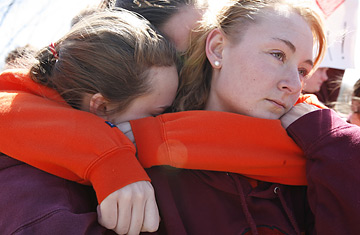
Students mourn at Virginia Tech University after the shooting rampage that killed 33 people.
As a state panel in Virginia continues to investigate the fatal shootings at Virginia Tech, university and local mental health officials have been arguing over who's to blame for not making sure Cho Seung-Hui, the troubled student who shot and killed 32 people before killing himself on April 16, received the outpatient psychiatric treatment a judge had ordered for him in 2005. The campus massacre also prompted colleges around the country to look for weaknesses in their own mental health programs. Since then, one thing has become clear: there is widespread confusion about whether federal privacy laws prevent school mental health counselors from sharing information about a distressed student with administrators or family members.
Complex laws including the Family Educational Rights and Privacy Act of 1974 (FERPA) allow for nonconsensual disclosure during health or safety emergencies, but schools are far from certain about when these exemptions apply. "I don't think there's a campus in America that hasn't sat down and asked themselves, 'What does FERPA really say?'" says Peter Lake, an expert on higher education law at Florida's Stetson University.
With colleges and their attorneys struggling to develop emergency mental health protocols that clearly establish who can be told what information and when, many campuses are trying to improve awareness of—and responses to—early warning signs that a student may be in psychological distress. One focal point has been residential advisors (RAs), the older students or junior faculty members who live in dorms alongside students. The University of Nebraska at Lincoln has been implementing a policy where a mental health professional is placed as a live-in member of every dorm on campus. In addition, RAs are trained in basic mental health counseling but are encouraged to get professionals involved as early as possible in situations of concern. The University of Richmond in Virginia is also increasing training for RAs in crisis response and management. While faculty and university police already receive this training, Richmond is adding sessions to include the student staff so as to streamline guidelines and protocols for action.
At Hamilton College in New York, administrators are taking the opposite course. Campus administrators are restructuring RA training to focus less on mental health counseling; they say they are recognizing that these students are not professionals and can be overwhelmed by a crash course in How to Be a Shrink 101. Instead, RAs are being trained to refer students in potential danger to trained professionals who are best equipped to assist them. "We used to provide a huge amount of information about mental health and counseling, and our RAs sometimes felt overwhelmed, or like they were counselors themselves," said Travis Hill, director of residential life at Hamilton, in a press release. "That's bad for them, and bad for the troubled student. Now, we're focused on making RAs a resource to make referrals to trained professionals who can handle potentially dangerous situations."
While college administrators hope that these upgrades in mental health policy will promote a safer environment, others argue that more still needs to be done to ensure that schools are correctly and consistently interpreting privacy laws in an appropriate fashion. "The bottom line is that administrators and clinicians have much more discretion than they may believe with regard to sharing information," says Dr. Paul Appelbaum, director of the Division of Psychiatry, Law, and Ethics, Department of Psychiatry at Columbia University. Although schools have read and re-read FERPA ad nauseam this summer, Appelbaum says he wants clear-cut guidelines from the Department of Education and the Department of Health and Human Services. "Otherwise," he says, "we are likely to continue to see divergent interpretations on different campuses, often driven by concerns over liability and fueled by continued misunderstanding."